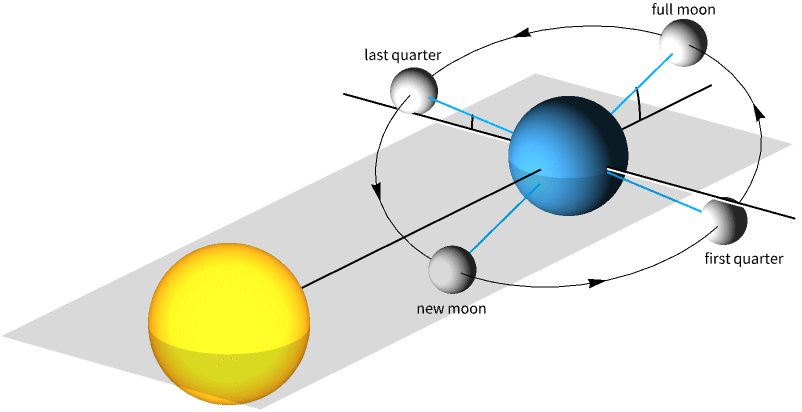NewMoon
NewMoon[]
gives the date of the next new moon.
NewMoon[date]
gives the date of the first new moon after the given date.
Details and Options

- The instant of new moon is defined by the conjunction of the Moon and the Sun in ecliptic longitude.
- In NewMoon[date], date can be any DateObject expression.
- Options of NewMoon include:
-
CalendarType Automatic calendar used to return dates DateFormat Automatic format used to display output dates DateGranularity Automatic calendar granularity of output dates TimeDirection 1 whether to return the next or last new moon TimeSystem Automatic time system of output dates TimeZone $TimeZone time zone of output dates

Examples
open allclose allBasic Examples (2)
Scope (3)
Options (6)
CalendarType (1)
NewMoon returns dates in the Gregorian calendar by default:
DateFormat (1)
NewMoon returns dates in a long format by default:
DateGranularity (1)
NewMoon returns dates with granularity "Instant" by default:
TimeDirection (1)
NewMoon finds the next new moon by default:
TimeSystem (1)
NewMoon returns dates in universal time by default:
TimeZone (1)
NewMoon returns dates in your local time zone by default:
Applications (1)
Properties & Relations (6)
At the instant of new moon, the Moon and the Sun have the same ecliptic longitude:
The distance between new moons is called a synodic month, and varies between 29.26 and 29.80 days:
The average synodic month is about 29.53 days:
NewMoon returns the date of the next new moon:
Use FullMoon to find the date of the next full moon, which may be before or after that new moon:
Use MoonPhaseDate to find the date of any phase of the Moon:
MoonPhase computes the phase fraction of illumination, which is close to zero for a new moon:
New moons correspond to integer lunation numbers:
Therefore, an alternative way of finding new moons is calling FromLunationNumber with integers:
Every solar eclipse happens within a few minutes of a new moon:
Only 2 to 5 of the 12 or 13 new moons in a year are close to solar eclipses:
Text
Wolfram Research (2024), NewMoon, Wolfram Language function, https://reference.wolfram.com/language/ref/NewMoon.html.
CMS
Wolfram Language. 2024. "NewMoon." Wolfram Language & System Documentation Center. Wolfram Research. https://reference.wolfram.com/language/ref/NewMoon.html.
APA
Wolfram Language. (2024). NewMoon. Wolfram Language & System Documentation Center. Retrieved from https://reference.wolfram.com/language/ref/NewMoon.html